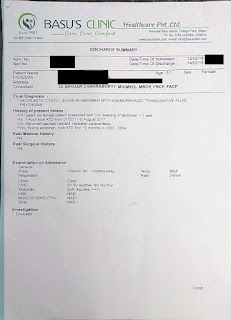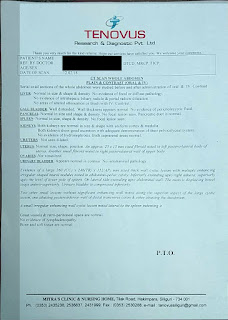This is a HIPAA de-identified open-online-patient-record with initial information in patient's voice, posted here after collecting informed patient consent (form downloadable Click Here) by BMJ Elective Student.
This case is about a 51 years old female-
Abstract:
Clinical story by the son of the patient (own words):
This case is about a 51 years old female-
Abstract:
Mentally ill person (1992) >> 4 years of failed treatment>>new treatment by neurosurgeon>> symptoms improved (restlessness, insomnia, going here and there, sense) 60-70% >> then low memory, speaks less, less receptive to questions, can not remain silent for a moment, appear to walk all around, don't do normal household activities [still has the problem] >> fever started at 2002 >> no improvement for a year >> hemoglobin and weight reduced and ascities >> diagnosed with TB >> treated with ATT (Akurit-4 and Akurit-3) for 10 months with improvement of the condition
While continuing psyciatric medicines developed swollen abdomen in 2016 july (without any other similiar symptoms) >> in January 2017, diagnosed with Tb again >> treated with Forcox 2 TAB for 3 Months এবং RHE-FD 1 TAB for 5 Months >> no improvement after 8 montsh TB medicines >> further investigated by a doctor in 2018 and advised open biopsy of cystic lesion in the abdomen >> Referred to hyderabad.
Clinical story by the son of the patient (own words):
The patient is my mother who is a mentally-ill person. Her treatment started fromt the year 1992 and even after taking treatment for 4 years her condition didn't improve. Then we met a neurosurgeon and he prescribed some medicines (written below with "*" mark). After taking these medicines, her restlessness and insomnia improved, she used to go outside here and there, which also improved. She didn't have any sense which also improved by 60-70%.
* Lithosun SR (Lithium Carbonet 400) 1 TAB twice daily. Now use one TAB only bed time.
* Ridazine 25 (Thioridazine Hydrochloride USP 25Mg) 1 TAB twice daily. Now use one TAB only bed time.
* Trazine SC/ Chlorfluhex (Trifluoperazine Hydrochloride i.p. equivalent to Trifluoperazine -5Mg. Trihexyphenidyl Hydrochloride i.p- 2Mg. Chlorpromazine Hydrochloride i.p.- 50Mg). 1 TAB only bed time.
* Trazine SC/ Chlorfluhex (Trifluoperazine Hydrochloride i.p. equivalent to Trifluoperazine -5Mg. Trihexyphenidyl Hydrochloride i.p- 2Mg. Chlorpromazine Hydrochloride i.p.- 50Mg). 1 TAB only bed time.
* rapex 1 (Lorazipum- 1Mg) [sos]
Presently, her memory is very low and speaks very very less and less receptive to the questions being asked. She can not stay anywhere being silent for a moment. She always appear to walk around and can not do normal houshold activities with her consciousness. She still has the same problems.
Whie continuing the same medicines, from december 2002 she started getting fever and even after 1 year of treatment fever didn't subside. Later her hemoglobin and weight had been reduced significantly and also got fluid in her abdomen and she was like about to die. One of our local doctor in a hospital presumed this to be a tuberculosis and prescribed ‘Akurit-4’ 2 TAB daily. Few days after starting these medicines, her fever subsided and she started to improve. The doctor then advised to continue Akurit-4 for 3 months and Akurit-3 for 7 months.Withing 10 months patient got improved and she took these medicines from December 2003 to september 2004.
Current Condition:
She is still continuing the psyciatric medicines described above once at bed time.Since July 2016, her abodomen appears to be swollen and then in Janyary 2017, doctor said about fluid in the abdomen after USG and fluid test ADA-52.8. This time doctor again diagnosed this as TB and advised starting ATT and we started taking TB medicines privately. This time her weight was 60 kg without any fever symptom and din't have any symptoms other than the fluid in the abdomen. Color of the fluid was reddish. Doctor advised Forcox 2 TAB for 3 Months এবং RHE-FD 1 TAB for 5 Months. After taking TB medicines for 8 months, her abdominal fludi still didn't go down. Every 2 months adbominal fluid was taken out. Even now her abdomen is full of fluid and in February 2018 we met a a doctor in siliguri and he advised Blood Test, Fuild Test, Whole Body CT Scan Abdomen. In her reports it is written that, in her abdominal sac where the fluid is accumulated is surrounded by some marks (গোটা গোটা চিহ্ন) and doctor further added that this fluid filled sac needs to be removed and should be evaluated with a biopsy and advised to go to Hyderabad.









Comments
Post a Comment